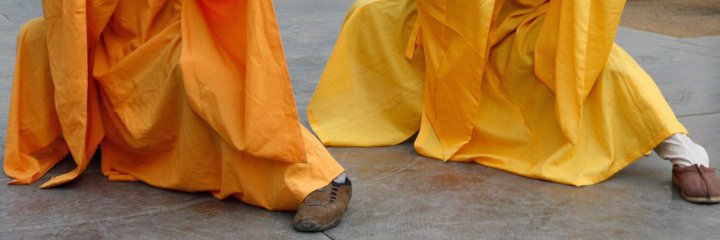
Fighting Spirit
天下皆謂我道大 似不肖 Everyone says that my kung fu is strong, but they also say it looks a bit unorthodox.
夫唯大故 似不肖 The whole reason it's so strong is that it looks a bit strange. 若肖久矣 It's an ancient tradition. 其細也夫 That means it evolves, doesn't it?
我有三寶 My kung fu still has three old gems from the old days. 持而保之 If you take them too, they'll keep you safe. 一曰慈 二曰儉 三曰不敢為天下先 The first is compassion, the second is restraint, the third is not being a bully. 慈故能勇 儉故能廣 不敢為天下先故能為成器長 Compassion inspires us, restraint empowers us, not being a bully gets the best results.
今 舍慈且勇 舍儉且廣 舍後且先 Modern kung fu is a hero with no compassion, a cop with no restraint, a boss with no respect. 死矣 That means it's a dead end.
夫慈以戰則勝 以守則固 When we bring compassion to the fight, we prevail, in defence, we're safe. 天將救之 以慈衛之 God is with us, and with compassion, watches over us.
Notes
不肖 is the quality of being not like one's forebears. A conservative interpretation would probably take 不肖 as unorthodox or unconventional if not outright unworthy.
I think that 若肖久矣 其細也夫 is something like a subjunctive in English. Since (my 道) is an ancient tradition (肖久), that means it's humble (細), doesn't it?
I like 持而保之 as a conditional. If held dear, then protected by them.
My riff on 儉 is economy moderation temperance prudence restraint self-control simplicity frugality parsimony.
Mawangdui versions of this poem contrast 為天下先 more clearly with 為成事長 (A) and 為成器長 (B) than does Wangbi's 成器長, and Han Feizi quotes the saying as it appears in Mawangdui A. 成器 is pretty common in ctext and seems to be a vessel or other artifact fashioned from raw (樸?) wood or jade. 成事 is very common in ctext, and seems to mean something like achievement in modern Chinese.
舍X且Y is more literally set aside X in favour of Y.
天 is arguable, as usual.